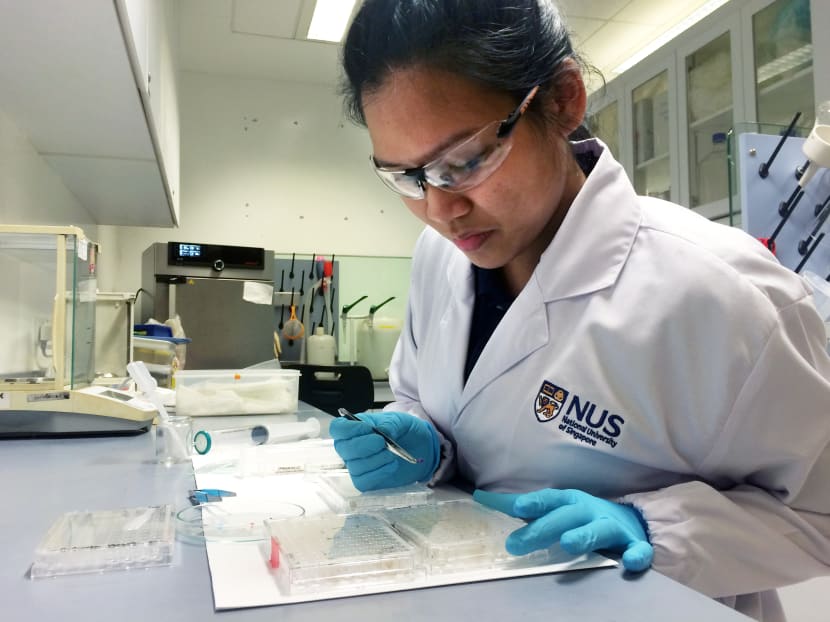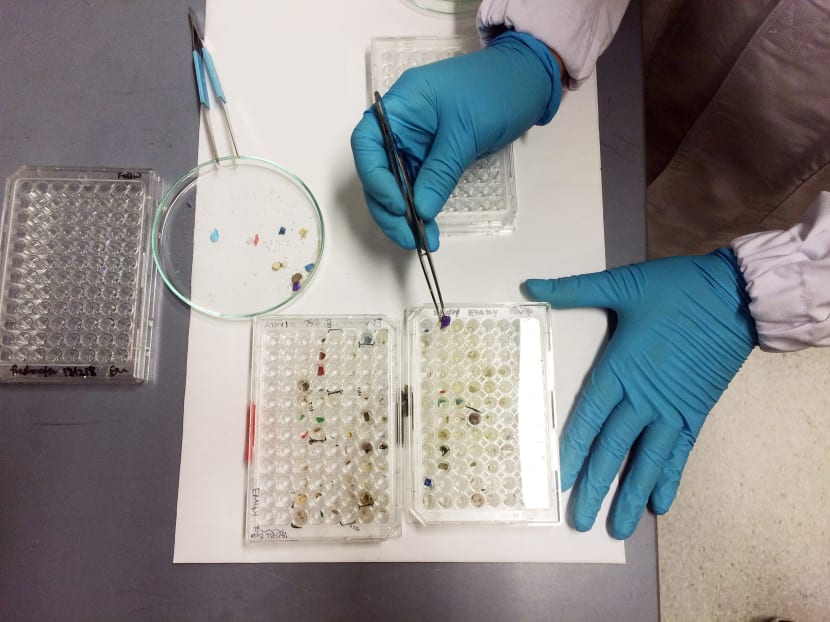Toxic bacteria found on small pieces of plastic trash from S'pore beaches
SINGAPORE — The small pieces of plastic trash on Singapore's shores are a hotbed for bacteria, some of which are toxic to humans.

Ms Emily Curren is doing her PhD on the diversity and distribution of tropical marine cyanobacteria.
SINGAPORE — The small pieces of plastic trash on Singapore's shores are a hotbed for bacteria, some of which are toxic to humans, a study has found.
Researchers from the National University of Singapore (NUS) discovered more than 400 types of bacteria on 275 pieces of microplastics collected from the beaches of Changi, Sembawang and Lazarus Island between April and July last year.
The bacteria include those associated with coral bleaching (Photobacterium rosenbergii) and those that cause wound infection (Vibrio) or gastroenteritis in humans (Arcobacter).
WHAT ARE MICROPLASTICS?
Microplastics are pieces of plastic that are smaller than 5mm. While some are manufactured — products such as microbeads found in facial scrubs or cosmetics, resin pellets and synthetic fibres — others are the result of the degradation of larger items such as plastic bags.
The study, conducted by NUS Tropical Marine Science Institute senior research fellow Sandric Leong and PhD student Emily Curren, was the first to examine the bacterial community on microplastics found in tropical coastal regions.
It was published last November in the journal Science of the Total Environment.
Plastic pollution is a growing environmental problem worldwide, with more than 150 million tonnes of plastic in the ocean.
Microplastics take longer to degrade in the sea than on land, due to the lower temperatures and presence of salt.
They can be mistaken for food by marine animals such as mussels and fish, which may end up in the stomachs of humans. Studies have found microplastics in human faeces.
They may also leach toxic substances.
BACTERIA: SOME TOXIC, SOME BENEFICIAL
Of the more than 400 types of bacteria that the researchers had discovered on microplastics here and then identified through DNA sequencing, about a third are considered toxic, while about 40 per cent have useful properties, Ms Curren told reporters on Monday (Feb 11).
The latter are able to degrade marine pollutants such as hydrocarbons, for example.
There is not enough evidence to suggest if the remaining bacteria are toxic or beneficial.
But while the “beneficial” bacteria may help in the mitigation of plastic pollution and toxic pollutants, they may not necessarily be good for humans or marine life, she said.

Meanwhile, the discovery of bacteria associated with coral bleaching could have implications for coral reefs around Singapore, especially those under conservation.
The identification of bacteria toxic to humans may help in measures to prevent the spread of diseases.
The researchers found that the bacteria were able to survive two weeks even in dry and dark conditions.
PLASTICS A GOOD HABITAT — FOR BACTERIA
There may be overlaps in the bacteria found on microplastics and other items found in the sea, such as wood or metal debris, said Ms Curren.
“But mostly plastics are a very good habitat for them… because these plastics have grooves that allow bacteria to attach to and because of the sheer volume of the amount of plastic,” she said.
Styrofoam pieces were the most abundant microplastic the researchers found.
Going forward, Ms Curren hopes to investigate if microplastics aid the introduction of foreign organisms, which can disrupt local ecosystems.
She also wants to determine if microplastics help to transport toxic species that, for instance, can contribute to harmful algal blooms which can cause mass fish deaths.






